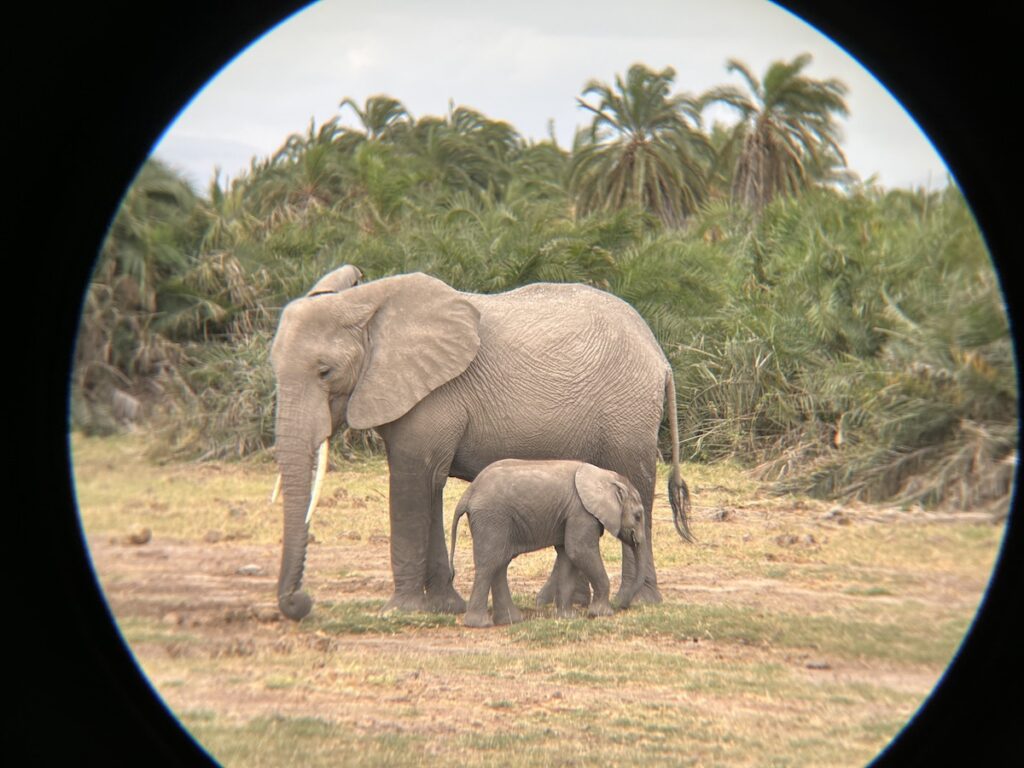Amboseli National Park lies at the foot of Mount Kilimanjaro and is known as the “Home of the African Elephant”. It is not considered a large park as it occupies an area of only 392 square kilometers. In Masai, Amboseli means “salty dusty place”. True to its name, Amboseli is an extremely dusty place with fine orange dust floating through the air and settling on everything and anything. From the road, you can often see dust storms gathering in the distance and sometimes it is unavoidable to drive through them. After a day in the Land Cruiser with the windows open, our bodies, hair, clothing and pretty much everything was caked in a layer of dust.
The land between Amboseli National Park and our Airbnb, Amboseli Bush Camp, is contiguous, meaning that the animals can roam freely, though it takes 20 minutes to drive from one entrance to the other. We went to visit the park two mornings in a row as the park entrance ticket is valid for 24 hours.
Upon entering the park, it is obvious that the environment in Amboseli is very different compared to the Mara and to Ol Pejeta. Most of the terrain is very dry with trees and shrubs that appear half-dead, all with very little greenery. The area is currently in a drought and there hasn’t been substantial rain in about a year and a half. Despite its appearance, we were told that after substantial rains, the entire place can come to life in a week.
Closer to the middle of the park, there is an extensive system of wetlands and swamps. The wetlands serve as the only permanent source of water for the animals in Amboseli. The water comes from underground springs fed from water trickling down from Mount Kilimanjaro. The swamp supports an amazing diversity of animals in the park including the Big 5, over 1200 elephants and 400 species of birds. Although water levels in the swamp are considered low, there appeared to be enough water at the moment. Because of the drought, Maasai cattle herds have been allowed to graze in the national park because there is insufficient grazing lands outside of the park for the herds to survive. This is another example of the accommodations that take place, that we first observed in the Enonkishu Conservancy, so the needs of all of the stakeholders are addressed.
Jackson is very familiar with Amboseli and the area is also Maasai, so we all felt right at home. After a few minutes in the park, Jackson spotted two cheetahs walking directly toward our vehicle. We stopped to watch an amazing interaction between the two cheetahs and a herd of wildebeest who were suspicious of the cheetahs’ intentions. As the cheetahs walked through the herd, the wildebeest watched them with a careful eye. Once the cheetahs passed, some of the wildebeest even chased after them as if to show their supremacy in scaring them away.
Jackson brought us to a small hill called “Observation Hill” to get a higher vantage point of the swamp and the park. In the waters, we could see huge groups of hippos and so many varieties of birds like the flamingo, African jacana, Goliath heron, Hartlaub’s bustard, Marabou stork and many more. All over the park, the park lived up to its nickname of “Home of the African Elephant” as we could see herds of elephants in every direction.
The second morning when we went back to Amboseli, it was a glorious day of elephant watching. By DY’s count, we saw over 100 elephants in just a few hours. Some of the elephants got so close to our parked vehicle, I could look straight into their eyes and it seemed that they were looking into my eyes too.
Author
-

Song is the mother of four children. She and her family have stepped away from it all and in September 2023, began traveling the world while homeschooling. Song is an ABC (American born Chinese) and has an undergraduate degree from Cornell and an MBA from Harvard. She is an entrepreneur and an educator. Her hobbies include learning, traveling, reading, cooking and baking, and being with children.

